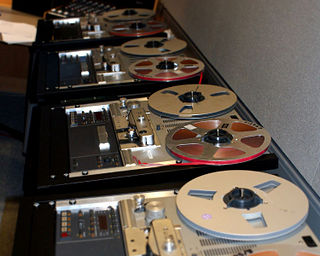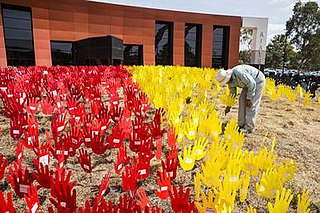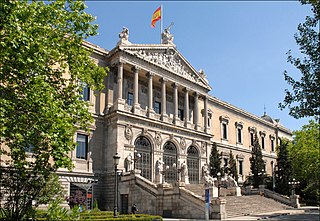This is a list of sound archives.
A sound archive(s) is a specialized archive that is often maintained by a nation, state, university, non-profit organization, or corporation. This article contains a list of sound archives.
This is a list of sound archives.
A sound archive(s) is a specialized archive that is often maintained by a nation, state, university, non-profit organization, or corporation. This article contains a list of sound archives.

Legal deposit is a legal requirement that a person or group submit copies of their publications to a repository, usually a library. The number of copies required varies from country to country. Typically, the national library is the primary repository of these copies. In some countries there is also a legal deposit requirement placed on the government, and it is required to send copies of documents to publicly accessible libraries.

A music library contains music-related materials for patron use. Collections may also include non-print materials, such as digitized music scores or audio recordings. Use of such materials may be limited to specific patron groups, especially in private academic institutions. Music library print collections include dictionaries and encyclopedias, indexes and directories, printed music, music serials, bibliographies, and other music literature. Some public libraries have music rooms.

Cinema of Colombia refers to film productions made in Colombia, or considered Colombian for other reasons. Colombian cinema, like any national cinema, is a historical process with industrial and artistic aspects.

The British Library Sound Archive, formerly the British Institute of Recorded Sound; also known as the National Sound Archive (NSA), in London, England is among the largest collections of recorded sound in the world, including music, spoken word and ambient recordings. It holds more than six million recordings, including over a million discs and 200,000 tapes. These include commercial record releases, radio broadcasts, and privately made recordings.

The Australian Institute of Aboriginal and Torres Strait Islander Studies (AIATSIS), established as the Australian Institute of Aboriginal Studies (AIAS) in 1964, is an independent Australian Government statutory authority. It is a collecting, publishing, and research institute and is considered to be Australia's premier resource for information about the cultures and societies of Aboriginal and Torres Strait Islander peoples.

The Biblioteca Nacional de España is a major public library, the largest in Spain, and one of the largest in the world. It is located in Madrid, on the Paseo de Recoletos.

The National Recording Registry is a list of sound recordings that "are culturally, historically, or aesthetically significant, and inform or reflect life in the United States." The registry was established by the National Recording Preservation Act of 2000, which created the National Recording Preservation Board, whose members are appointed by the Librarian of Congress. The recordings preserved in the United States National Recording Registry form a registry of recordings selected yearly by the National Recording Preservation Board for preservation in the Library of Congress.

The National Film and Sound Archive of Australia (NFSA), known as ScreenSound Australia from 1999 to 2004, is Australia's audiovisual archive, responsible for developing, preserving, maintaining, promoting, and providing access to a national collection of film, television, sound, radio, video games, new media, and related documents and artefacts. The collection ranges from works created in the late nineteenth century when the recorded sound and film industries were in their infancy, to those made in the present day.
The Association for Recorded Sound Collections (ARSC) is a nonprofit organization dedicated to the preservation and study of sound recordings. Established in 1966, members include record collectors, discographers, and audio engineers, together with librarians, curators, archivists, and researchers.
The Audio-Visual Preservation Trust of Canada. originally the Alliance for the Preservation of Canada's Audio-Visual Heritage, was a charitable non-profit organization dedicated to promoting the preservation of Canada's audiovisual heritage, and to facilitating access to regional and national collections through partnerships with members of Canada's audiovisual community.
The Hamilton Library at the University of Hawaiʻi at Mānoa is the largest research library in the state of Hawaii. The Library serves as a key resource for the flagship Manoa campus as well as the other University of Hawaiʻi system campuses.
Music Australia was a free national online service hosted by the National Library of Australia, launched on 14 March 2005, covering all types, styles, and genres of Australian music. It was integrated into Trove in 2012.

The International Association of Sound and Audiovisual Archives (IASA) was established in 1969 to serve as a forum for international co-operation between archives, libraries, and individuals interested in the preservation of recorded sound and audiovisual documents.
The Coordinating Council of Audiovisual Archives Associations (CCAAA) is an umbrella group of international private organizations working on audiovisual archiving. These professional organizations have a common goal of promoting and encouraging the preservation and the accessibility of the world's audiovisual heritage. The CCAAA member organisations work with many AV materials including: films, TV, radio, photographs and audio recordings.

The Österreichische Mediathek is the Austrian archive for sound recordings and videos on cultural and contemporary history. It was founded in 1960 as Österreichische Phonothek by the Ministry of Education and has been a branch of the Technisches Museum Wien since 2001. As video and sound archive, the Österreichische Mediathek is responsible for the preservation of the Austrian audio-visual cultural heritage.

The Indiana University Archives of Traditional Music holds over 100,000 individual audio and video recordings across over 3500 collections of field, broadcast, and commercial recordings. Its holdings are primarily focused on audiovisual recordings relating to research in the academic disciplines of ethnomusicology, folklore, anthropology, linguistics, and various area studies.
'Unlocking Our Sound Heritage' (UOSH) is a UK-wide project that aims to preserve, digitise and provide public access to a large part of the nation's sound heritage. The UOSH project forms part of the core programme 'Save Our Sounds' led by the British Library and involving a consortium of ten regional and national archival institutions. Between 2017 and 2022 the aim is to digitise and make available up to 500,000 rare and unique sounds recordings, not only from the British Library's collection but from across the UK, dating from the birth of recorded sound in the 1880s to the present time. The recordings include sounds such as local dialects and accents, oral histories, previously inaccessible musical performances and plays, and rare wildlife sounds. The consortium will also deliver various public engagement programmes, and a website where up to 100,000 recordings will be freely available to everyone for research, enjoyment and inspiration.